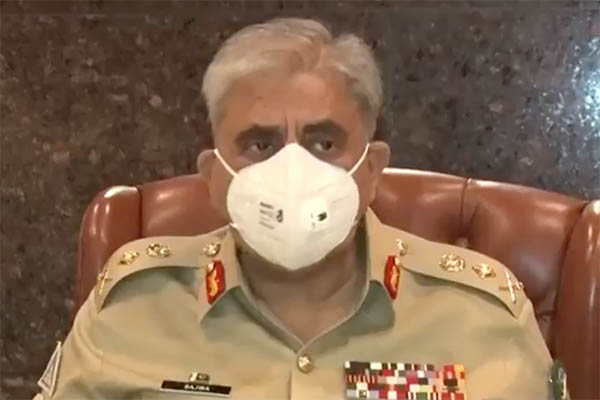
File photo. Courtesy ISPR
Army chief Gen. Bajwa appreciates military’s operational readiness in view of ongoing security threats
The 241st Corps Commanders’ Conference on Tuesday took serious notice of the rise of cross-border firing from Afghanistan and the regrouping of terrorist outfits there, with the participants hoping that the neighboring state’s soil will not be used against Pakistan.
Chaired by Chief of Army Staff (COAS) Gen. Qamar Javed Bajwa, the forum convened at the General Headquarters in Rawalpindi, according to a statement issued by the Inter-Services Public Relations (ISPR). It said that the participants comprehensively reviewed the global, regional, and domestic security environment with a particular focus on the situation along Pakistan’s borders, especially the Line of Control and the Working Boundary, as well as the Pak-Afghan border.
During the meeting, the forum was briefed on evolving operational imperatives and corresponding strategy to meet upcoming challenges. The Army chief expressed satisfaction over the military’s operational readiness in view of the emerging security threats.
Reviewing recent developments in the ongoing Afghan peace process and its expected effects on the country’s security situation, especially along the Pak-Afghan border, the forum reaffirmed Islamabad’s support for regional peace and stability. It noted that Pakistan had undertaken effective border control/management measures in light of the emerging regional security situation, adding that reciprocation was expected from Afghanistan to deny any space to spoilers of peace.
The forum also reviewed the situation in the erstwhile tribal areas and Balochistan, stressing that expediting socioeconomic development of these areas should capitalize on the hard-earned peace to ensure enduring stability.
Gen. Bajwa, said the ISPR, appreciated the military’s formations for their all-out support to civil administration amidst the ongoing third wave of COVID-19, noting this had contributed to bringing a significant reduction in the spread of the pandemic and controlling its adverse effects.
